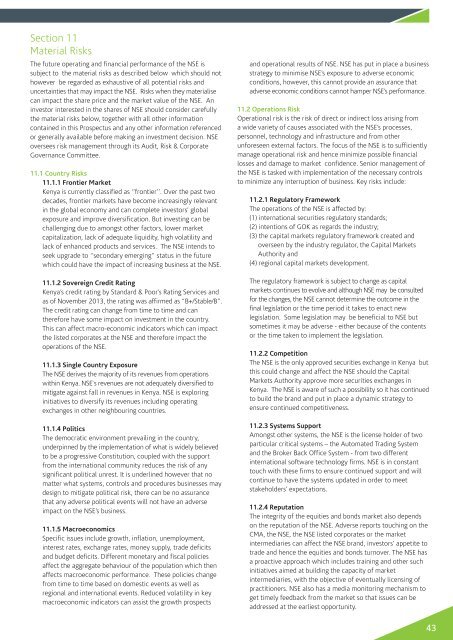NSE-Web-Prospectus-2014
NSE-Web-Prospectus-2014
NSE-Web-Prospectus-2014
- No tags were found...
You also want an ePaper? Increase the reach of your titles
YUMPU automatically turns print PDFs into web optimized ePapers that Google loves.
Section 11Material RisksThe future operating and financial performance of the <strong>NSE</strong> issubject to the material risks as described below which should nothowever be regarded as exhaustive of all potential risks anduncertainties that may impact the <strong>NSE</strong>. Risks when they materialisecan impact the share price and the market value of the <strong>NSE</strong>. Aninvestor interested in the shares of <strong>NSE</strong> should consider carefullythe material risks below, together with all other informationcontained in this <strong>Prospectus</strong> and any other information referencedor generally available before making an investment decision. <strong>NSE</strong>oversees risk management through its Audit, Risk & CorporateGovernance Committee.11.1 Country Risks11.1.1 Frontier MarketKenya is currently classified as ‘’frontier’’. Over the past twodecades, frontier markets have become increasingly relevantin the global economy and can complete investors’ globalexposure and improve diversification. But investing can bechallenging due to amongst other factors, lower marketcapitalization, lack of adequate liquidity, high volatility andlack of enhanced products and services. The <strong>NSE</strong> intends toseek upgrade to “secondary emerging” status in the futurewhich could have the impact of increasing business at the <strong>NSE</strong>.11.1.2 Sovereign Credit RatingKenya’s credit rating by Standard & Poor’s Rating Services andas of November 2013, the rating was affirmed as “B+/Stable/B”.The credit rating can change from time to time and cantherefore have some impact on investment in the country.This can affect macro-economic indicators which can impactthe listed corporates at the <strong>NSE</strong> and therefore impact theoperations of the <strong>NSE</strong>.11.1.3 Single Country ExposureThe <strong>NSE</strong> derives the majority of its revenues from operationswithin Kenya. <strong>NSE</strong>`s revenues are not adequately diversified tomitigate against fall in revenues in Kenya. <strong>NSE</strong> is exploringinitiatives to diversify its revenues including operatingexchanges in other neighbouring countries.11.1.4 PoliticsThe democratic environment prevailing in the country,underpinned by the implementation of what is widely believedto be a progressive Constitution, coupled with the supportfrom the international community reduces the risk of anysignificant political unrest. It is underlined however that nomatter what systems, controls and procedures businesses maydesign to mitigate political risk, there can be no assurancethat any adverse political events will not have an adverseimpact on the <strong>NSE</strong>’s business.11.1.5 MacroeconomicsSpecific issues include growth, inflation, unemployment,interest rates, exchange rates, money supply, trade deficitsand budget deficits. Different monetary and fiscal policiesaffect the aggregate behaviour of the population which thenaffects macroeconomic performance. These policies changefrom time to time based on domestic events as well asregional and international events. Reduced volatility in keymacroeconomic indicators can assist the growth prospectsand operational results of <strong>NSE</strong>. <strong>NSE</strong> has put in place a businessstrategy to minimise <strong>NSE</strong>’s exposure to adverse economicconditions, however, this cannot provide an assurance thatadverse economic conditions cannot hamper <strong>NSE</strong>’s performance.11.2 Operations RiskOperational risk is the risk of direct or indirect loss arising froma wide variety of causes associated with the <strong>NSE</strong>’s processes,personnel, technology and infrastructure and from otherunforeseen external factors. The focus of the <strong>NSE</strong> is to sufficientlymanage operational risk and hence minimize possible financiallosses and damage to market confidence. Senior management ofthe <strong>NSE</strong> is tasked with implementation of the necessary controlsto minimize any interruption of business. Key risks include:11.2.1 Regulatory FrameworkThe operations of the <strong>NSE</strong> is affected by:(1) international securities regulatory standards;(2) intentions of GOK as regards the industry;(3) the capital markets regulatory framework created andoverseen by the industry regulator, the Capital MarketsAuthority and(4) regional capital markets development.The regulatory framework is subject to change as capitalmarkets continues to evolve and although <strong>NSE</strong> may be consultedfor the changes, the <strong>NSE</strong> cannot determine the outcome in thefinal legislation or the time period it takes to enact newlegislation. Some legislation may be beneficial to <strong>NSE</strong> butsometimes it may be adverse - either because of the contentsor the time taken to implement the legislation.11.2.2 CompetitionThe <strong>NSE</strong> is the only approved securities exchange in Kenya butthis could change and affect the <strong>NSE</strong> should the CapitalMarkets Authority approve more securities exchanges inKenya. The <strong>NSE</strong> is aware of such a possibility so it has continuedto build the brand and put in place a dynamic strategy toensure continued competitiveness.11.2.3 Systems SupportAmongst other systems, the <strong>NSE</strong> is the license holder of twoparticular critical systems – the Automated Trading Systemand the Broker Back Office System - from two differentinternational software technology firms. <strong>NSE</strong> is in constanttouch with these firms to ensure continued support and willcontinue to have the systems updated in order to meetstakeholders’ expectations.11.2.4 ReputationThe integrity of the equities and bonds market also dependson the reputation of the <strong>NSE</strong>. Adverse reports touching on theCMA, the <strong>NSE</strong>, the <strong>NSE</strong> listed corporates or the marketintermediaries can affect the <strong>NSE</strong> brand, investors’ appetite totrade and hence the equities and bonds turnover. The <strong>NSE</strong> hasa proactive approach which includes training and other suchinitiatives aimed at building the capacity of marketintermediaries, with the objective of eventually licensing ofpractitioners. <strong>NSE</strong> also has a media monitoring mechanism toget timely feedback from the market so that issues can beaddressed at the earliest opportunity.43


